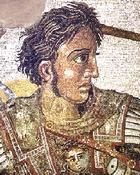
Lucio Arrian (Lucius Flavius Arrianus Latin), also known as Arrian of Nicomedia (Nicomedia, to 86 - Athens, 175), was a Greek historian and philosopher of the second century. He was born in the coastal town of Nicomedia (now Izmit), the capital of the Roman province of Bithynia in what is now Turkey, 70 km from Byzantium, now Istanbul. His works have given us the philosophy of Epictetus and the conquests of Alexander the Great. Not to be confused with Xenophon, the Athenian general and thinker of the fourth century. C., whose best known work is also titled Anabasis. He studied philosophy in Epirus with the Stoic philosopher Epictetus, and wrote to him the Manual works of Epictetus and Dissertations, two of the most important Stoic writings and capital work for theories of his teacher, because, like Socrates, Epictetus he was a lecturer who left no writings.
After finishing his studies, he entered the army as a knight in the service of Hadrian as it was a Roman citizen, and served in Gaul and the Danube frontier. In 129 he received the appointment of consul, first in Andalusia (Spain) and 130 for his brilliant service, was appointed proconsul (governor) of Cappadocia and commander of the Roman legions on the border with Armenia. Was exceptional for the time that a Greek got so high military rank. In 135, he repelled an invasion of Alans magnificently to organize the legions and auxiliary troops at its disposal, including the legions XII and XV Apollinaris Fulminata. He deployed the legionaries in depth supported with the javelin throwers with foot archers and horse archers in the rear, and defeated the assault of the Alans. This odyssey described in the work plan of mobilization against the Alans, which is one of the key texts for understanding tactics during the Roman empire.




